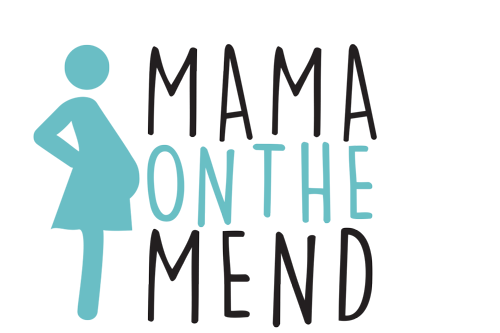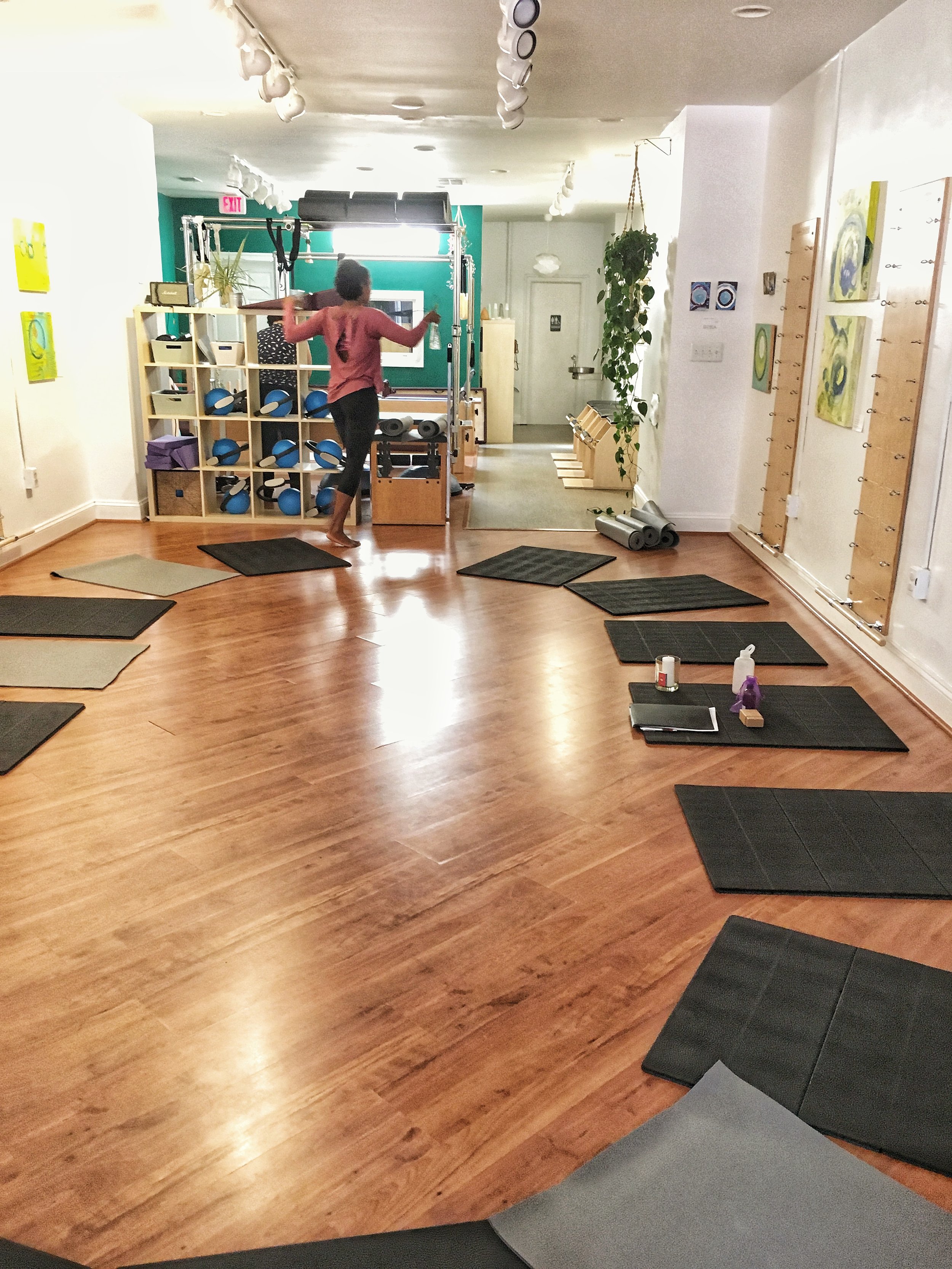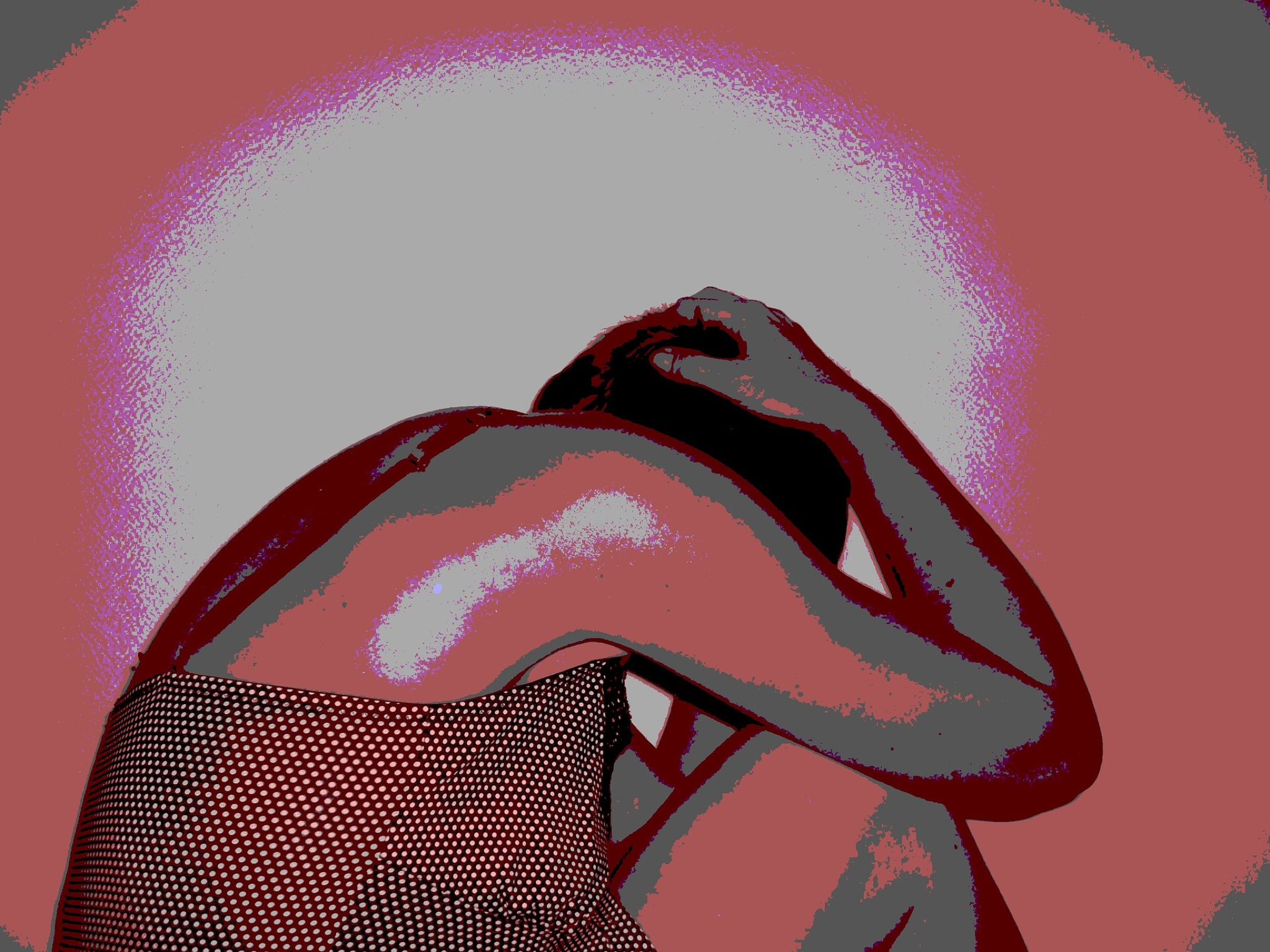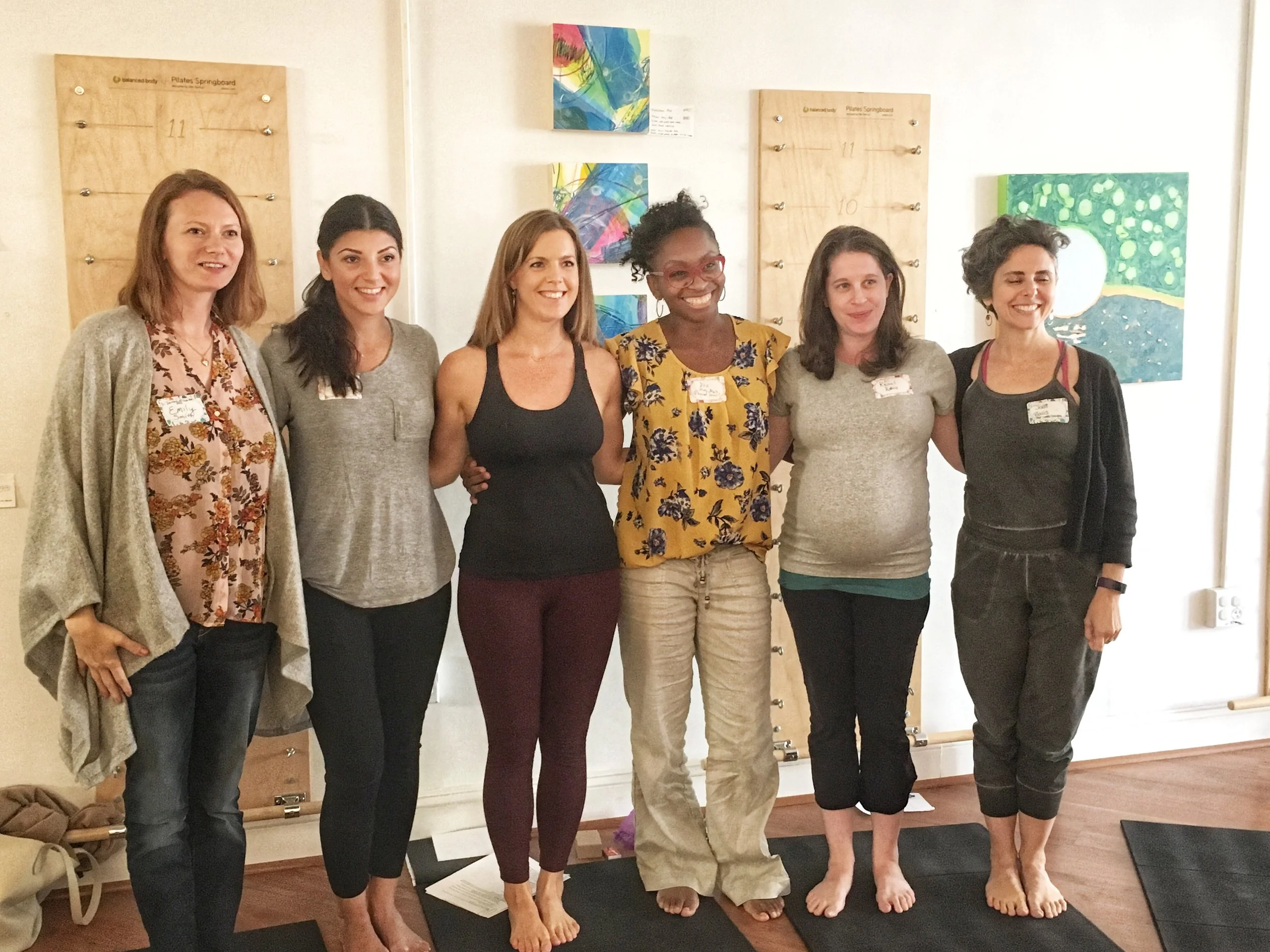Self-Care Is Hard but Six Perinatal Experts Share Why It’s So Important
/I sat cross-legged on a yoga mat facing a woman I met just minutes earlier. I was sharing with her what made me feel disconnected to my core. Not just my physical core, but the core of who I am.
She listened, without speaking or offering advice. When I was done, she told me what she heard me say. I thanked her for listening. Then it was her turn to tell me how she felt disconnected to her core.
Neither of us knew that we would bare our intimate struggles to a stranger that day. But as we engaged in this activity, the intensity of it caused tears to well up in both our eyes.
Frances Darnell is The founder of Dynamic Core. (Photo courtesy of Frances Darnell)
We were at the “Connect with Your Core” workshop for moms and pregnant women led by Frances Darnell of Dynamic Core. Frances is a Pilates instructor who brings a unique combination of healing and strengthening to the body while integrating reflection and coaching for personal growth.
With this workshop, Frances envisioned a space for pregnant women and moms coming together to deepen their connections with themselves and their community. She brought in perinatal professionals to help us engage in honest conversations about prenatal and postpartum experiences with local experts.
I almost didn’t go to the workshop because I felt like I didn’t have an entire afternoon to spare just for myself. It turns out virtually all the women there (including the panelists) felt the same way. This struggle to prioritize ourselves was one of the first issues we tackled.
France had designed the workshop in a way that created space for women to slow down, connect in with their bodies, and make decisions from this centered place from their core. It was a mini preview into her more comprehensive program Dynamic Mama.
We Hold Stress and the Weight of the World in Our Bodies
I personally loved the reflection and journal piece of the workshop. Just saying out loud how I felt disconnected to my body and to my sense of self, then having someone really hear me without comment or advice, was a rare gift. After the exercise, I could see that other workshop participants experienced a similar catharsis as they too were wiping away tears.
The Connect With Your Core Workshop was held at Rooted Pilates, a studio located in southeast Washington, DC
At this workshop, I explored my struggles with transitions. I felt in limbo during my post-graduation phase while trying to simultaneously adjust to my son’s new found “threenager” rage. I didn’t take good physical care of my health while surviving grad school and caring for my family. With the little spare time I had, I strove to be present for my son and partner, and had forgotten about myself.
It’s no wonder I felt so disconnected to my core.
But it was deeper than that.
I don’t know when exactly I developed this tendency, but I needed to be productive, always. If I wasn’t doing something, going somewhere, striving for the next goal or milestone, I somehow thought I wasn’t contributing enough to my family or society. Talk about self-imposed pressure, right?
This tendency made me an excellent student, but not very compassionate toward myself as a mother. It felt like a sum zero game: taking time for myself meant not taking care of others, which meant that I was selfish.
Sound familiar?
For a long time, I’ve carried this pressure and stress all over my body. My shoulders are perpetually tight. I regularly clench my butt, my abs, and my jaws. More recently, I learned I also clench my pelvic floor, which means it’s constantly tight and weak and not moving properly.
During the workshop, when Frances moved us through a gentle Pilates session, I could feel exactly how wound up I was. Even though I consciously blocked off time to be there, my body was confused by the nourishing movements I was giving it. Initially, my body resisted. It wasn’t sure exactly how to unclench that butt or jaw.
But after that short session, I felt a tad more in tune with myself. It was just what I needed to feel the difference between my clenched and unclenched self.
Perinatal Experts Offer Insight and Suggestions for Self-Care
In the second half of the workshop, Frances moderated a panel of perinatal specialists. It included a doula, pelvic physical therapist, a urologic surgeon, a clinical psychologist, and a dietitian.
Each spoke about common issues they saw among pregnant women and moms in their line of work. They offered recommendations, but more important than that they encouraged us, in specific ways, to nourish of ourselves during these intimate and intense times.
Below are some of their key takeaways:
Dr. Rachel Rubin, MD | Urologic Surgeon
Dr. Rubin started off by stating, “No one taught us real sex ed.” She was referring to straightforward topics like basic anatomy. Most of us, she suggested, weren’t educated on the location and function of our sexual anatomy and how hormones can change them, especially during and after pregnancy. For Dr. Rubin, it goes deeper than knowing our anatomy: “No one taught us how to talk about sex, it’s really hard.”
Dr. Rachel Rubin is a urologic surgeon who specializes in the treatment of sexual dysfunction. (Photo courtesy of Dr. Rachel Rubin)
She emphasized that sex is never supposed to hurt, and that we can’t and shouldn’t just push through the pain. Sex doesn’t have to be penetrative either, it’s about having good experiences, Dr. Rubin told us.
As a medical doctor, and specifically a surgeon, I was expecting Dr. Rubin to be clinical and somewhat detached from the lived experiences of her patients. I was skeptical from countless experiences of feeling dismissed by my doctors. Dr. Rubin was nothing like that.
It was so refreshing to hear her encourage us to be an advocate for ourselves. She emphatically told us not to take “we don’t know” as an answer from our providers when we tell them we have pain. She explained that OBGYNs aren’t trained in the area of sexual function. It’s not their fault, they just didn’t learn it. So, if you have a problem with your clitoris—she said as an example—your doctor might not know how to examine it.
I loved that Dr. Rubin also talked about how motherhood isn’t necessarily a physical pleasure. I know for me, there was a lot of guilt in admitting that. She explained how breastfeeding women are menopausal and that breastfeeding isn’t always enjoyable because it’s an act of nourishment for another. Moms can also face sensory overload or feel “touched out,” which is why Dr. Rubin recommended that moms take time to explore their bodies and understand what’s pleasurable for themselves. I definitely related to that “touched out” feeling.
To nurture oneself, her suggestion was quite simple: focus on pleasure and avoid pain. If something is painful don’t do it, seek help, and be your own best advocate.
Dr. Ann Udofia specializes in pelvic health physical therapy. (Photo courtesy of Dr. Ann Udofia)
Dr. Ann Udofia, PT, DPT | Licensed Physical Therapist
Dr. Udofia sees a lot of postpartum women with core instability, diastasis recti, incontinence, and a general sense of not feeling stable in their bodies. In her talk she was fundamentally against this cultural belief that these conditions were our “new normal.”
She stressed that we shouldn’t normalize the fact that so many women pee when they laugh, cough, jump, or run. Nor should we accept pelvic pain with sex. Echoing off of Dr. Rubin, Dr. Udofia said that postpartum women aren’t always checked for issues of the pelvic floor, or even asked about it.
Dr. Udofia also spoke about retraining women’s bodies to their proper alignment. She noticed a tendency for new moms to over-arch their backs and protrude their necks forward. Malalignment has a cascading impact on rest of your body. I know for me, breastfeeding alone hurt my back like hell, never mind my wobbly torso. Some days I didn’t feel strong enough to hold my son, even if when he was just barely ten pounds.
To nurture ourselves, Dr. Udofia recommended creating time to receive body work. She told us how it’s important that we create a space to connect physically and feel into our bodies in nurturing ways. This can be yoga, Pilates, physical therapy, acupuncture, massages, etc. Her bottom line was to not accept our postpartum issues as our “new normal” and to have a better conversation to address them.
Emily Smith is a doula and childbirth educator for the greater Washington, DC area. (Photo courtesy of Emily Smith)
Emily Smith | Doula
Doulas are one of the most underrated providers in this pregnancy, childbirth, and postpartum spaces. I had a doula for my birth and during the postpartum phase. Because of my doula, I felt supported and cared for throughout this incredible and intense time in my life.
When Emily, co-founder of Doulas of Capitol Hill, spoke at the workshop she so clearly reminded me of the incredible work of doulas and what they have to offer. Simply put, she said doulas offer physical, emotional, and informational support for childbirth and the postpartum phase. (Some doulas focus on birth or postpartum only. Many do both.)
Not all doulas are created equal. Emily explained it was crucial that she and the practitioners in her practice provided support without judgment. Many of us have experienced the onslaught of people who suddenly have expert opinions and judgments on how to give birth and take care of our newborn. A professional and skilled doula knows how to empower women by meeting them where they are.
Beyond offering physical, emotional, and educational support, Emily shared how her team offers social services like mom-to-mom matching. It’s kind of like a blind date for moms going through a similar phase of early motherhood. How great is that? It’s part of one of their guiding principles: to build community. (The other two are to support the family and grow the profession.)
One of the ways Emily’s team helps postpartum women nurture themselves is by encouraging them to own their stories. The center gives out journals for women to document their journey. Even if it may be uncomfortable, it can also be nurturing for the soul. Emily closed her talk with words by Brené Brown: “Owning our story and loving ourselves through that process is the bravest thing that we will ever do.”
Dr. Sahar Esfahani is a Clinical Psychologist at Washington Anxiety Center of Capitol Hill. (Photo courtesy of Sahar Esfahani)
Dr. Sahar Esfahani | Clinical Psychologist
The transition to motherhood is anxiety-provoking. We have more decisions and options than any generation prior to us, yet with less guidance or communal wisdom. Dr. Esfahani said she sees the toll of this combination among her patients.
Dr Esfahani helps women navigate the uncertainty that comes with giving birth and dealing with a newborn through Cognitive Behavioral Therapy, which is helpful for anxiety. It’s heavy on implementing strategies, it’s goal-focused, and deals most directly with issues occurring in the present.
What really resonated from Dr. Esfahani’s discussion was her attention to the kinds of self-talk we engage in and the narratives we create around our anxiety and sadness, which can feel really heavy. She explained how she helps patients cultivate a different relationship with themselves and their feelings.
Dr. Esfahani also recognized how values and priorities can shift after giving birth. So through Acceptance and Commitment Therapy, she helps patients identify new values and facilitates their navigation through that transition.
One way we can nurture ourselves, according to Dr. Esfahani, is by showing up for ourselves. Find a time in the day (even if for five minutes) to do something just for you. She also recommended seeking help and learning more through the Anxiety and Depression Association of America.
Jodi Balis is a registered dietitian and food life organizer. (Photo courtesy of Jodi Balis)
Jodi Balis | Registered Dietician and Food Life Organizer
The panel discussion ended with Jodi. Her takeaway message was so simple: EAT !
Especially during that early postpartum stage, eating can be a challenge, but she emphasized the importance of nourishing ourselves with food to support the shifts within our body. She also encouraged us to have an energetic experience with the food we eat and to incorporate rituals around eating, which can include bringing special items or decoration to the table, cooking specific foods, eating with intention, and consciously feeling the food in us.
One mom asked what most of us were thinking: “How can we enjoy eating again? With a young child, the experience at the table just isn’t enjoyable anymore.”
As a mother of two, Jodi fully recognized how our experiences around meals can change with children. She wasn’t fighting this reality, rather she reminded us that this phase is temporary. In the meanwhile she recommended redefining and shifting that pleasure with meals to a to a smaller experience, like a cup of coffee or tea, and to really embrace it.
In addition to simply making sure that we eat to nourish ourselves, Jodi recommended allowing our friends to feed us, whether they cook for us or offer us take out. She also suggested broths, congee, and warm bowls that are packed with nutrients yet simple and cozy. It’s that season after all.
---
To wrap up the entire workshop, Frances reminded us of the importance to create a space for ourselves that helps us connect with our physical and spiritual core. She asked us to huddle in a small circle interlinking arms as we each shared one word to describe how we felt at the workshop’s conclusion. Words like “love,” “acceptance,” “healing,” “community,” “empathy” floated around.
In our cluster Frances reminded us that the proceeds of the workshop were donated to Mamatoto Village to support perinatal care in another community, extending the energy from this workshop further out to others.
Before breaking out of the circle to return to our hectic lives, Jodi offered everyone delicious energy cacao bites. As we held this snack in our hands, Fran helped us thank the panelists and one another for our time together. We then promptly took a bite. Yum :)
What does creating a space just for you look like? How often do you take time just for yourself? What helps you feel connected to your core?
[For more information about the panelists, check out their bios and websites below
Left to right: Emily Smith, Dr. Sahar Esfahani, Frances Darnell, Dr. Ann Udofia, Dr. Rachel Rubin, and Jodi Balis
FRANCES DARNELL | DYNAMIC CORE
Frances Darnell facilitated this workshop and is the Founder of Dynamic Core, a Pilates and integrated wellness practice focused on empowering women to activate their innate power so that they can live the life they truly desire. Fran's passion is in helping women revolutionize the legacy they are living and modeling for their children and inspiring women to powerfully choose how they want to feel and what they want to embody both for themselves and their loved ones.
This fall, she will run a 9-week group program called “Dynamic Mama” for mamas and mama-to-be. Dynamic Mama empowers you to approach motherhood with energy, strength, and alignment. This intimate program, based in DC, combines mindful movement and coaching to help you reconnect with your body, reclaim your strength, and gracefully move through the miracles of motherhood. For more information about Dynamic Mama, visit https://dynamiccorewellness.com/dynamicmama. Enrollment is now open and the program starts October 16th.
DR. RACHEL RUBIN | INTIMMEDICINE SPECIALISTS
Dr. Rachel Rubin is a urologic surgeon who specializes in the treatment of sexual dysfunction in both men and women. Her expertise includes pelvic pain, hormone imbalance, low libido, sexual arousal/orgasm disorders, and urinary incontinence. Dr. Rubin prioritizes taking the time to understand her patient’s individual and unique situation and to develop a highly-personalized, evidence-based treatment plan based on each patient’s goals
ANN UDOFIA | BODY CONNECT HEALTH + WELLNESS
Ann Udofia PT, DPT is a pelvic physical therapist and co-founder of Body Connect Health and Wellness—a holistic physical therapy practice located in West End DC. She specializes in prenatal/postpartum health, pelvic health physical therapy, and Myofascial Release for the treatment of chronic pain issues. Ann has found a lot of success treating various musculoskeletal and urogynecological conditions using a hands on, whole body approach. She is particularly committed to community education and empowering her patients in taking active roles in their health and wellness.
EMILY SMITH | DOULAS OF CAPITOL HILL + DOULAS OF PG COUNTY
Emily Smith is the owner and Chief Operations Officer of Doulas of Capitol Hill and also a sister agency, Doulas of Prince George's County, which she co-founded with Nicole Bruno and Jacquelin Knighton in 2016 and 2018, respectively. She has worked for 10 years serving families in the greater Washington, DC area as a birth doula, hypnodoula, postpartum doula, childbirth educator, placenta encapsulation specialist, and sibling doula.
SAHAR ESFAHANI | WASHINGTON ANXIETY CENTER OF CAPITOL HILL
Dr. Sahar Esfahani is a clinical psychologist at the Washington Anxiety Center of Capitol Hill where she provides Cognitive Behavioral Therapies to children, adolescents and adults. She works with clients with a range of anxiety, mood, and obsessive-compulsive spectrum disorders, and provides evidence-based treatments including: Exposure and Response Prevention (ERP), Mindfulness, and Acceptance and Commitment Therapy (ACT) among others.
JODI BALIS | RED LENTIL CONSULTING
Jodi Balis is a healer, food intuitive and personal chef who creates nourishing food to support women through body shifts. Jodi co-creates a food ritual with mamas that are navigating through transition, and incorporates a nourishing meal, Reiki, meditation and shamanic healing. She holds space for women, intuits what foods uniquely provide support throughout these shifts and incorporates those into a ritual meal.
**Medical disclaimer: This post is provided as an information resource only, and is not to be used or relied on for any diagnostic or treatment purposes. This information should not be used as a substitute for professional diagnosis, treatment, or advice. Always seek the guidance of your physician or other qualified health care provider with any questions you may have regarding your postpartum care and conditions.














